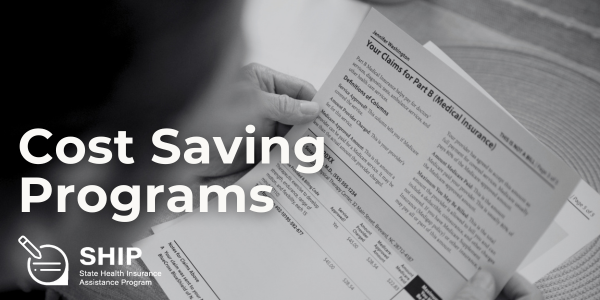Today, we’ll discuss various programs that can help you save on your Medicare costs.
First, understand the benefits offered by the Medicare Savings Programs.
Medicare Savings Programs (MSPs), help pay your Medicare costs if you have limited income and savings. There are three main programs, each with different benefits and eligibility requirements. If your income is up to around $1,700 per month as an individual, or around $2,300 per month as a couple, you may qualify for an MSP. However, your exact eligibility requirements depend on the state in which you live. Some states have higher income limits, and others don’t have any limits on your assets.
If you qualify for any one of the three MSPs, your Part B monthly premium will no longer be deducted from your Social Security check. One of the MSPs, called QMB, also eliminates all cost-sharing for Medicare-covered services. You cannot choose to apply for a certain MSP; you will be enrolled in the MSP that corresponds to your income, assets (in some states), and application details.
To see if you’re eligible for an MSP in your state, contact your State Health Insurance Assistance Program (SHIP). Use our online SHIP Locator or call 877-839-2675 (and say Medicare
when prompted) to find your local SHIP.
Let’s also look at the benefits and eligibility guidelines for Extra Help.
Extra Help is a federal program that helps pay for some to most of the out-of-pocket costs of Medicare prescription drug coverage.
- The Extra Help program pays for your Part D premium up to a state-specific benchmark amount and lowers the cost of your prescription drugs.
- Additionally, it eliminates any Part D late enrollment penalty you may have.
- Extra Help also gives you Special Enrollment Periods throughout the year to enroll in a Part D plan or switch between plans.
It’s important to know that Extra Help is not a replacement for Part D alone. You must still have a Part D plan to receive Medicare prescription drug coverage and Extra Help assistance.
You should be automatically enrolled in Extra Help if you have Medicaid, Supplemental Security Income, or a Medicare Savings Program. Otherwise, you may be eligible for Extra Help if your income is up to around $1,900 per month as an individual, or up to around $2,500 per month as a couple, and you have limited assets. If you are not automatically enrolled, you can apply for Extra Help through the Social Security Administration.
There are a few other ways to receive assistance with Medicare costs:
Many states offer State Pharmaceutical Assistance Programs (SPAPs) to help residents pay for prescription drugs. Each program works differently. SPAPs may pay for your Part D plan’s premium, deductible, or copayments. You can contact your SHIP to learn about any SPAPs in your state. Use our online SHIP Locator or call 877-839-2675 (and say Medicare
when prompted) to find your local SHIP.
Additionally, if you need health services at a reduced cost, there are two types of facilities that may be able to help. First, there are hundreds of government-funded health centers around the country that provide medical care regardless of your ability to pay. These clinics may be called HRSA Health Centers, Federally Qualified Health Centers, or FQHCs. Second, most states have the Hill-Burton program, which offers free or reduced cost care at Hill-Burton facilities.
Finally, you may be eligible for Medicaid, which may cover services that Medicare doesn’t, like dental services and long-term care. Medicaid can also coordinate with Medicare, as a secondary payer, covering Medicare’s out-of-pocket costs. Generally, your income and assets must be below a certain amount to qualify. These limits vary from state to state and from program to program.
Finally, know your rights and protections.
There are a few important things to know about MSPs. First, Medicare Savings Programs are available to all people with Medicare, not just those enrolled in certain Medicare Advantage Plans. Some Medicare Advantage Plans offer to assist beneficiaries with the MSP application, but this assistance should not be described as a supplemental benefit or as a premium-free
Medicare Advantage Plan. All people with Medicare can apply for an MSP and can contact their local SHIP if they need assistance applying.
Second, if you are enrolled in the QMB MSP, providers cannot bill you for any Medicare deductibles, coinsurance charges, or copayments as long as they accept Medicare or are in-network for your Medicare Advantage Plan. (Note that some states may impose small Medicaid copays for certain Medicare-covered services.) Providers who violate improper billing protections may be subject to penalties. If you have a QMB MSP and your provider bills you for services, tell them you should not be billed. If you are having issues with a provider who continually attempts to bill you, call your local Senior Medicare Patrol (SMP). SMPs empower and assist Medicare beneficiaries, their families, and caregivers to prevent, detect, and report potential Medicare fraud, errors, and abuse.
Still have questions?
Your SHIP is here for you! You can contact your SHIP for any Medicare-related questions or concerns you have. SHIP counselors are government funded to provide trusted, unbiased Medicare counseling at no cost to you. (Depending on your state, your SHIP may go by another name.) Use our online SHIP Locator or call 877-839-2675 (and say Medicare
when prompted) to find your local SHIP.

